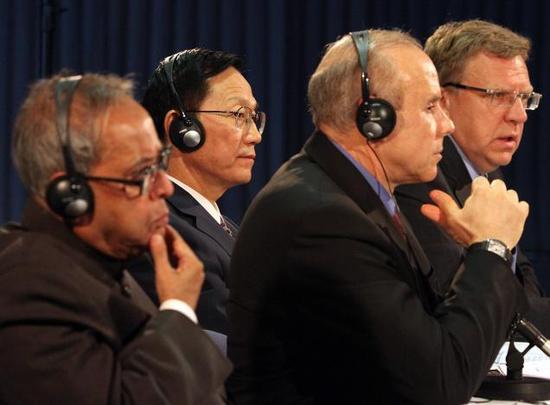Today I arrived in Delhi to participate in the track II meeting of the BRICS Summit as part of the Brazilian delegation. India’s foreign policy community is abuzz with the recent visit of the Chinese delegation around China’s Foreign Minister Yang Jiechi to debate several Indian proposals about how to institutionalize the BRICS alliance. Compared to the summit in Brasília in 2009 and the Sanya meeting in 2010, this year’s summit hosts seem to have dedicated a lot of time and energy towards preparing the talks.
On the one hand, this euphoria could lead to dissappointment – many of the proposals such as a BRICS Development Bank, a common BRICS stock exchange, and a common BRICS World Bank candidate, seem smart in theory but may be hard to implement considering the differing interests between the BRICS members. Yet, as several Indian diplomats told me this morning, a massive promotion of ‘out-of-the-box thinking’ could develop new narratives and frameworks that could eventually feed into the BRICS leaders’ summit’s final declaration.
One of the most ambitious projects is to establish a BRICS Development Bank, which have I written about in a previous post. Long seen as a fanciful project, it was the principal subject of the bilateral talks between China and India over the past days in Delhi. New Delhi has, several weeks ago, circulated a concept note on the BRICS Bank with the other member governments. During the last days, China’s Foreign Minister apparently specified demands over who would be the president’s of the proposed bank. India wants a rotating presidency on the lines of other regional groupings, but China wanted a fixed presidency for itself given the size and expanse of its economy.
Critics will use this as evidence that the project is likely to fail even before it comes into existence. Yet the fact that such a disagreement emerged at all is also proof that the discussion has advanced to a level where specific questions such as who is to lead the institution are already being debated.
What could most easily derail plans to create a BRICS Development Bank is a decision by established powers to accept long-standing demand for reforming the existing multilateral banks. At the same time, the political cost of backtracking on the creation of the new institution will inrease, making the ‘South-South Bank’ ever more likely.
Read also:
Is it time for a BRICS Development Bank?
BRIC nations set to take bigger global role
Book review: “Theories of International Politics and Zombies” by Daniel W. Drezner
Seeing India through Brazilian eyes
Photo credit: AP









